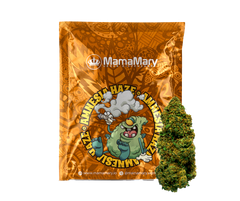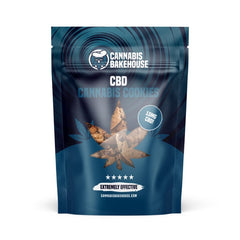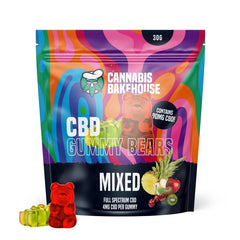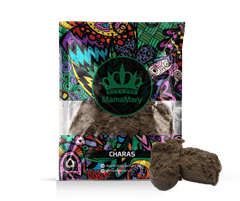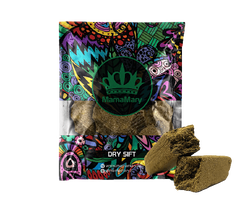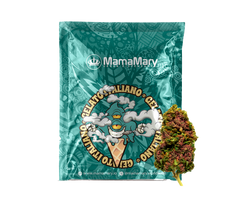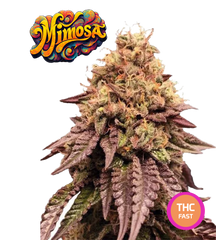A new cannabinoid has emerged from the United States and is becoming popular on all legal cannabis and hemp blogs: we are obviously talking about hexahydrocannabinol (HHC). Today we find out what it is and its differences with CBD and THC.
The idea to write this article came to us when we at MamaMary visited the Cannafest in Prague where HHC was present on the posters of most of the stands, becoming the absolute protagonist of this festival.
Looking around, however, we realized that it is not yet very well known in the Italian panorama. Furthermore, the fact that it is a novelty on the market makes the literature on it very confusing and contradictory, especially regarding the effects and its actual legality.
So let's try to clarify and find out:
Ready? Let's go!
What is HHC? Discover This Lab-Created Synthetic Cannabinoid
Hexahydrocannabinol (HHC) is a semi-synthetic molecule. In fact, its production uses a process called “hydrogenation”, which transforms CBD into HHC. It is semi-synthetic precisely because it comes from natural ingredients and is then modified in the laboratory, but its nature is still organic.
Its birth occurred in 1944 from an idea of Roger Adams, and it could be said that HHC was discovered in a laboratory. How? The scientist added hydrogen molecules to delta-9 THC producing this semi-synthetic product that, in addition to having effects similar to THC, had effects on the central nervous system. Originally this molecule was therefore created from THC, but now, thanks to the great availability of legal industrial hemp plants, its creation is mainly done starting from CBD.
The methods used to create it are described in detail by Allison Justice, Ph.D., CEO of The Hemp Mine, who says that the process through which HHC is produced is the same as that used for some products we consume every day, such as margarine. It is in fact a process known as hydrogenation , or adding hydrogen atoms to the compound using a chemical element belonging to the metal family as a catalyst. Using the previous example, from vegetable oil thanks to the process, margarine is obtained.
Referring to the production of HHC, the doctor adds:
<<Adding two more [hydrogens] makes the ring “hexa” hydrogenated” >> hence “hexahydrocannabinol”. He then continues: <<In other words, all six carbons of the ring are completely saturated with hydrogens. This increases stability, but also changes the molecule’s ability to interact with cannabinoid receptors.>>
Its effects, according to many consumers, are surprisingly similar to those of THC, but milder and with a psychoactive component present but limited. To describe them, Leafly reports the words of Liam Burns, of Bearly Legal ,
“Personally, with HHC I feel energetic,” he confirms, “I go to the gym. I am awake, my mind works properly. Normally I have back and shoulder pain, but when I take it I feel it no more.”
The active ingredient in the substance is 9R HHC which binds to the endocannabinoid system producing the known effects, while the other molecule, 9S HHC does not produce any effects. For this reason, it is usually attempted to produce HHC with a higher percentage of 9R HHC than 9S HHC. Whether or not its consumption is recommended, given its similarity to tetrahydrocannabinol (THC), is still a mystery.
Although no particular contraindications have been found for the substance nor have side effects been demonstrated, long-term studies have yet to be conducted. For now, the substance seems to be available in many formats: from oil to liquid for vape pens, to sweets, it seems to be very successful, especially in the United States.
HHC vs CBD
We have already talked about what CBD is, but let's summarize for those who are not experts in the field: cannabidiol is a molecule that is naturally found inside the cannabis plant, also called light cannabis or legal marijuana. It is therefore a cannabinoid that is naturally found inside a plant, this is the first difference with hexahydrocannabinol which, as previously explained, is produced in the laboratory through the chemical process of hydrogenation, which makes it partially synthetic.
Another issue that makes them differ is the effects produced by each of these two substances. From this point of view we find a very strong point in common, in fact both act on the endocannabinoid system.
Cannabidiol is mainly known for its relaxing and therapeutic effects, its interaction with the cannabinoid system and its strong analgesic, calming and anti-inflammatory properties have made it the first choice for many people suffering from pathologies and not only.
The cannabinoid HHC, as previously mentioned, offers effects comparable to those of THC. That said, some studies seem to also celebrate its therapeutic effects . One in particular discusses its analgesic effects on some guinea pigs and encourages its study from this perspective also on humans.
HHC vs THC
Not only CBD, but also THC, is a cannabidiol naturally present in the cannabis plant, in particular its highest concentrations are found in the sativa type I and II, which we all know as “marijuana”. The first difference therefore, as for CBD, is its biological nature against the chemical nature of HHC.
Both substances then stimulate the endocannabinoid system, in different ways and producing different consequences.
If THC is the substance with psychoactive effects par excellence, the psychoactive properties of HHC are kept under control and can be chemically regulated, producing HHC with a higher component of its non-active part, i.e. 9S HHC.
More specifically, THC binds with the CB1 and CB2 receptors, producing the effects we consider part of the “high sensation.” Due to its chemical structure that resembles that of THC, hexahydrocannabinol could do the same, but in-depth studies on the subject have not yet been conducted, so while we do not know exactly if this junction occurs, we do know that its effects can be compared to those of THC.
In particular, they seem to have in common the feeling of euphoria and lightness, the improvement of mood, the increase in hunger and the relaxation of the muscles.
Is HHC legal in Europe?
HHC has been on the market for a short time but it can already be found in many formats: from flowers to oil, through vape pen liquids, it seems to be landing in every sector of the cannabis market. Many are the producers and retailers who invest every day in this sector and in hhc-based products.
In America, its use and sale are partially clarified by the 2018 Farm Bill, a document that legalizes the cultivation of all those products that contain a percentage of THC lower than 0.3%. Since HHC is derived from industrial hemp, it meets these conditions and qualifies as legal in most states of the country, although in some such as Idaho, Arkansas or Arizona, it is still illegal.
It is important to know that the situation in Europe regarding its use and sale is confusing and varies from country to country. In Germany and France, for example, you can find many products that contain HHC, but this is a situation that we could compare to that of CBD in its early days: since there is no single and clear law, each country legislates separately. In Italy, in fact, there are still no laws that regulate its sale or marketing, so it is in a gray area in a very similar way to CBD, therefore stating whether it is legal or not is still a matter of discussion.
We will certainly have some great things to see in the coming months.
We hope this article has clarified some of your doubts on the subject and let us know about your experiences if you have tried it!
Comment if you have any other questions: we will be happy to answer as best we can 😎






